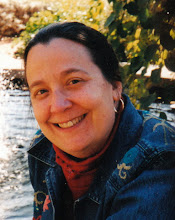
Those of you who receive my quarterly newsletter are perhaps already familiar with June Hall, the founder of "The Unbroken Thread", a project to assist rural Lithuanian craftswomen with preserving their spinning and knitting heritage as well as finding markets for their knit goods. Here's a picture of June Hall (she's on the right) with writer and professional knitter Donna Druchunas on a trip to Lithuania.
The information I received from June was far more comprehensive than space allowed in the newsletter, but so interesting and well told that I wanted to devote blog space for June to tell you more about her work. Here's the first installment concerning June's wonderful project, in her own words.
"After our mother died in 1999, my sister Vivien and I decided to investigate the family story that we had a Lithuanian ancestor. No facts, just a rumor. We made our first journey there in 2002, for just a week, but packed so much in, saw wonderful places and felt so at home, that we hoped to return.
The opportunity came the following year, when I moved house, joined a few interest groups, and found that there is a small charity in Cumbria (northern England) called Lithuania Link. (www.lithuanialink.org) . They were offering bursaries for people to do three months voluntary work on social and/or environmental projects in Lithuania. This was too good to miss. I decided to apply, to investigate my own interest in sheep, traditional knitting and rural life, with a view to helping the social and economic situation of the countryside there. That was a good idea at the time, and has taken over much of my life since!
I spent an initial week in Lithuania to make contacts and find my way around. In May 2004, Lithuania joined the European Union. We were there for the celebrations, for most of the day in Zagare, a town on the northern border with latvia, before returning the the capital of Vilnius. There was a huge air of optimism and joy, with an all-day concert in the town square, an enormous iced cake with "Now We Are Europeans" and flag on top, along with firework, national costumes and dancing. So, after gaining freedom from the Soviet Union in 1991, Lithuania had joined the west.
Then my sister and I spent the summer of 2004 investigating the theme. We met wonderful people and were privileged to be invited into homes, were taken to remote and fascinating places which no tourists would find for themselves and saw behind the scenes at museums. In many villages, we were the first native English speakers to visit the school. My sister formed a particular relationship with the school in Pociuneliai, and has raised a lot of money for them to buy equipment which their allowance would not cover.
Since our first working visit, I have been to Lithuania three or four times each year, and had many visitors from Lithuania to my home.
This is a time of rapid social, cultural and economic change in Lithuania. The difference between old and young, rich and poor, urban and rural, are becoming more extreme. Communism has given way to capitalism and people have to find their own way to live. For some, this is hard, especially for the elderly. yet these are the people with traditional skills, cultural heritage and knowledge of the land." (to be continued)

No comments:
Post a Comment